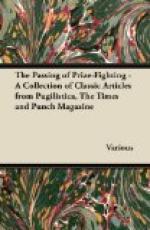“Oh, that’s nothing to do with the literary side of it,” I said, crumpling up the little memorandum, which said that the Editor presented compliments and regretted that he was unable to make use of the enclosed contribution.
* * * * *
“Mr. Henderson ... was
received with a cry of ’He is not on the
map now.’”—Times.
It is supposed that his supporter meant to say “not on the mat”—in reference to an incident at the close of Mr. HENDERSON’S Ministerial career. But many a true word is said in the Press by inadvertence.
* * * * *
[Illustration: THE WAR AGAINST THE PUBLIC.
PROFITEERING HEN. “NOTHING DOING AT FIVEPENCE. BUT I MIGHT PERHAPS LAY YOU ONE FOR NINEPENCE. WHAT! YOU THOUGHT THE WAR WAS OVER? NOT MY WAR.”]
* * * * *
[Illustration: Dear Old Lady (to returning warrior). “WELCOME BACK TO BLIMEY!”]
* * * * *
A DEMOBILISATION DISASTER.
Private Randle Janvers Binderbeck and Private John Hodge (of No. 12 Platoon) both enlisted in 1914. Previously Handle wrote articles, mostly denunciatory. He denounced the Government of the day, tight skirts, Christian Science, scorching on scooters, the foreign policy of Patagonia and many other things. John, on the other hand, had not an agile brain. He worked on a farm in some incredibly primitive capacity, and the only thing that he denounced was the quality of the beer at the “Waggon and Horses.” It certainly was bad.
In the Army Randle had no ambition except to get out of it and to remain a private while in it. His ambition for his civil career was tremendous. He tried to prod the placid John (his neighbour in their hut) into an equal ambition.
“My poor Hodge,” said Randle to John, “you must cultivate a soul above manure. Does it satisfy you, as a man made in the image of God, to be able to distinguish between a mangold and a swede? Think of the glory of literature, the power of the writer to send forth his burning words to millions and sway public opinion as the west wind sways the pliant willow.”
“I dunno as I’d prefer that to bird-scaring or suchlike,” murmured John.
Goaded by such beast-like placidity, Randle would forget all restraint in trying to lash John into a worthy ambition.
It was for talking after “Lights out” that Randle and John were given a punishment of three days’ confinement to barracks. Randle, pouring out a devastating torrent of words in the manner of a public orator, bitterly denounced the punishment; John, who had merely snored (the Captain said it took two to make a conversation), bore it with the stoicism of ignorance.
Randle used to dream of Peace Day. He heard Sir DOUGLAS HAIG order his Chief-of-Staff to summon Private Randle Janvers Binderbeck. “Release him at once,” said HAIG, in Randle’s dream, “to resume his colossal mission as leader and director of public opinion.”




